An almost vegan food crawl with Theo Rossi, 'Emily the Criminal' star and hummus traditionalist
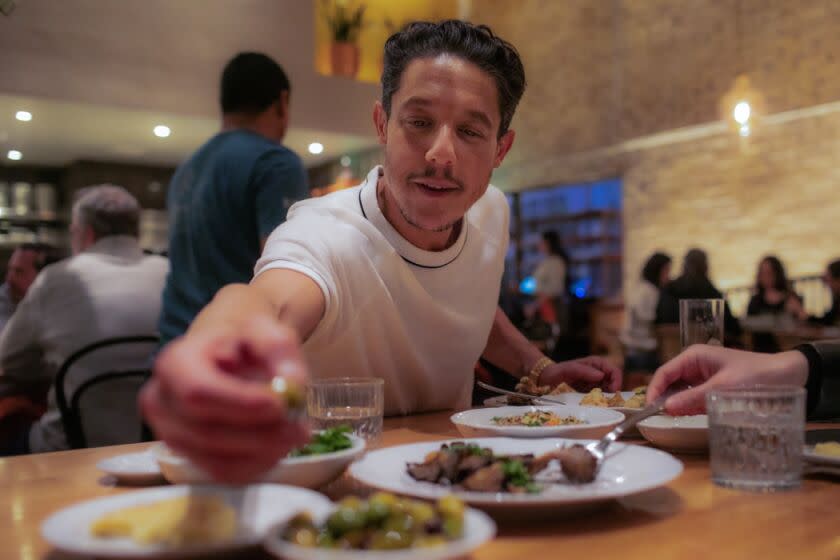
- Oops!Something went wrong.Please try again later.
- Oops!Something went wrong.Please try again later.
Theo Rossi is a pita bread and hummus connoisseur. The actor deems the pita and hummus at Bavel in the Arts District downtown to be among the best he's ever tasted. He should know — he eats some form of the bread-and-dip duo every day.
Rossi, who stars in the Roadside movie “Emily the Criminal” (streaming on Netflix) and is nominated for an Independent Spirit Award for portraying Youcef in the film, ate a lot of pita bread and hummus while preparing for the role of a lovable Lebanese criminal who dabbles in credit card fraud.
5:03 p.m. Bavel
Sitting at a table in the middle of the bustling dining room at Bavel on a recent evening, Rossi tears off a piece of hot, puffy pita bread and swipes it through the extra-smooth hummus masabacha.
“The pita bread here is absolutely outrageous,” he says, going in for another piece. “It’s super soft and just the right temperature. And the hummus is incredible.”
Rossi is at the start of a three-stop, almost vegan Mediterranean food crawl across the city. Over the last two decades, he’s appeared in dozens of films and TV series, including Marvel’s "Luke Cage" and "True Story" with Kevin Hart and Wesley Snipes. He is probably known best for playing Juan Carlos “Juice” Ortiz in the series “Sons of Anarchy.” With a plume of dark hair and a boyish grin, Rossi has a face that can project any background and time period. Youcef in “Emily the Criminal” is his first time playing a character who is Lebanese, similar to his own background.
“I told my mom, ‘Guess what?’ After 23 years, I’m finally going to play Lebanese,’” he says. “And she goes, ‘Let me guess, he’s a criminal.’ I told her he’s actually a nice guy. She’s always mad at the way Arabic people are portrayed.”
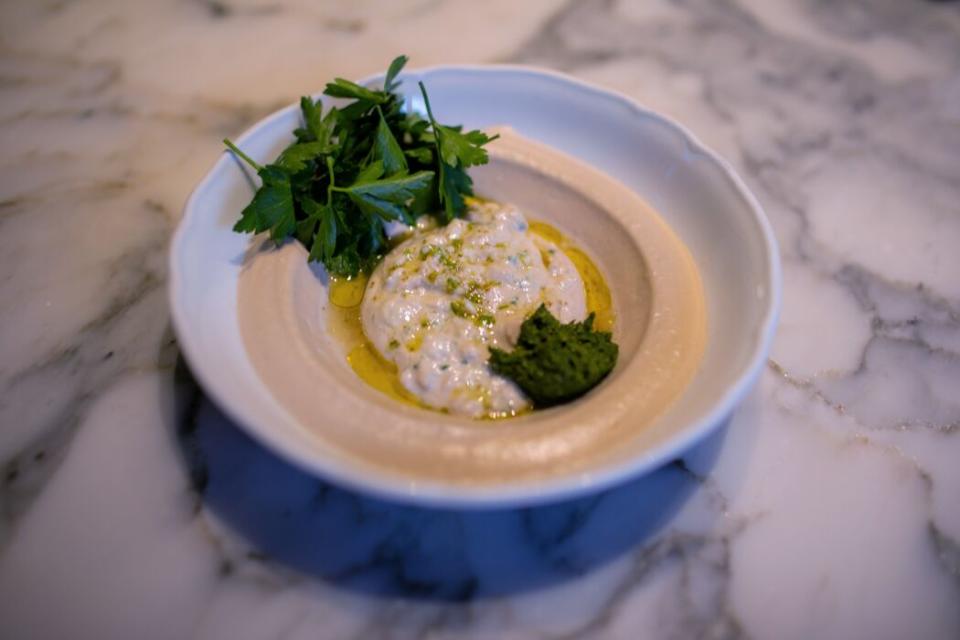
Youcef is a nice guy, despite teaching Emily, played by Aubrey Plaza, how to commit credit card fraud. And the film uses one scene in particular, centered on a family meal, to make you want to root for the two budding criminals even more when Youcef takes Emily home to meet his mother.
“Food is the thing that brings everybody together,” he says. Rossi comes from a large Lebanese, Syrian, Spanish and Italian family in New York, where dinners are frequent. “There are many people that you associate with in your life that you’ve never eaten with, but there’s something different about when you eat with them. It’s almost like you’re taking the relationship to another level,” he says.
For Rossi, food is a gateway to another life, one of the many ways he immerses himself in a character. To prepare for a role, he examines his character’s income level, where they grew up, the types of things they may have been into during their formative years and what they eat.
While filming “Emily the Criminal,” Rossi lived in an apartment in Glendale near the Americana at Brand shopping center. It’s an area dense with Lebanese Armenian restaurants.
“What does Youcef eat?” he says. “Everything we’re eating right now, which is what I pretty much had the entire time I was shooting. It was lots of olives, hummus, tabouleh, pita bread. Just to sort of feel connected to what I was doing.”
Before him at Bavel is a spread of vegetarian dishes (our server happily marked the dishes that could be made vegan or vegetarian), including the hummus masabacha, olives, tabouleh, cauliflower with tahini and oyster mushroom kebab. For the last few decades, Rossi has eaten a mostly plant-based diet, though he will introduce eggs if he wants to or needs the extra protein for a role. The pita bread at Bavel has eggs in it, and today, he’s eating eggs.
He dunks a piece of blistered cauliflower into a ramekin of pale yellow tahini.
“Wow," he says. "Y’all need to go in on that one.”

The table before him is quite the feast, and a drastic change from his everyday diet. Rossi is obsessive about many things, including his diet and daily routine, eating some variation on the same thing every day. He lives on a ranch in Austin, Texas, with his wife and two sons, and he starts each day by cleaning out barn stalls and going for a five- to eight-mile run. He then has two cups of coffee, black; along with two pieces of Ezekiel bread with almond butter; some raspberries, blueberries, strawberries and blackberries; one apple; and cinnamon sprinkled on everything. Then, he has some melon. If he’s eating eggs (he has 12 chickens and there’s never a shortage on the ranch), he eats some eggs. His midday snack is a handful of raw nuts. For dinner, warm pita bread, hummus and steamed vegetables grown in his garden. And if it's Friday, it’s pizza night.
“It’s comforting to me in this weird way because this business I’m in is so bizarre and crazy and unpredictable," he says. "I try to make things as routine and normal as possible."
At Bavel, he eats quickly and enthusiastically, serving himself large spoonfuls of the tabouleh, tossed in a sumac vinaigrette and studded with chopped vegetables and herbs. At one point, he says he’s going to drink the tahini that accompanies the cauliflower, and he does, just a little. He pauses to carefully examine the mushroom kebab, speckled with sumac and seasoned with Meyer lemon.
“I’m a bit of a mycologist, and I grow mushrooms on the ranch,” he says before taking a bite. “They just make everything better.”
“Holy s—,” he says, then gestures to everyone at the table. “Did you have the mushroom yet?"
He proceeds to eat half the order in a matter of seconds.
“I should probably slow down, but this place is so special.”
6:47 p.m. Open Sesame
At Open Sesame, a Lebanese restaurant on Beverly Boulevard in Los Angeles, Rossi is relieved to see grape leaves on the menu.
“Some people call it grape leaves, some people call it dolmas,” he says. “Whatever you call it, it’s the best dish.”
He orders the foods that remind him of the meals he ate with his family back in New York: falafel, loubieh and, of course, the grape leaves.
When Rossi first moved to Los Angeles in the early 2000s, he supported himself in between acting jobs by working as a barback, bartender and server at places like Saddle Ranch on Sunset Boulevard and Miyagi’s in Hollywood.
“I would say I was the best waiter ever,” he says. “I loved doing it.”
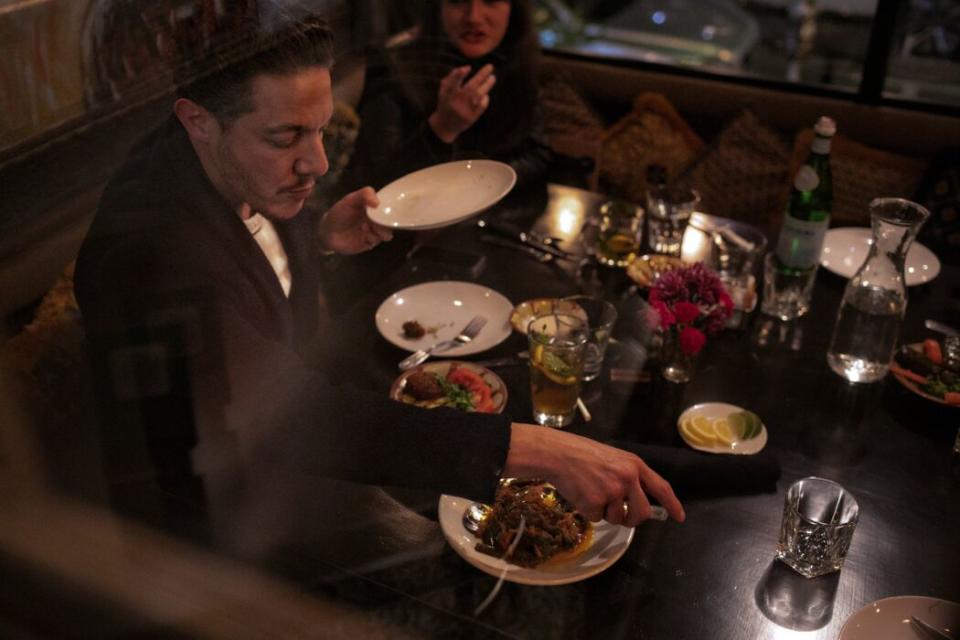
He was already mostly vegan, though even in Los Angeles there weren’t a ton of options at the time. He frequented the salad bar at Whole Foods, filling up countless brown boxes with grape leaves and hummus. When he lived in Eagle Rock, he ate at Café Four maybe five times a week.
“I didn’t have a ton of access to food like this,” he says as our second dinner arrives.
The green beans in the loubieh melt into the tomatoes, so soft they’re almost spreadable. Rossi reaches for the grape leaves as soon as they hit the table.
“These are pretty much the perfect food,” he says. “The texture, it’s just so comforting. I ate so many of these when I was a kid.” He eats another without blinking, then tries the falafel.
“People can really mess these up,” he says mid-bite. “You end up really needing the tahini, but I don’t even need it for this.”
The falafel burns the roof of his mouth, but he keeps chewing anyway, savoring the mashed chickpeas and crunchy shell.
“We’re going full savage on these,” he says. “I just mauled mine like a honey badger.”
8:02 p.m. Sunnin Lebanese Café
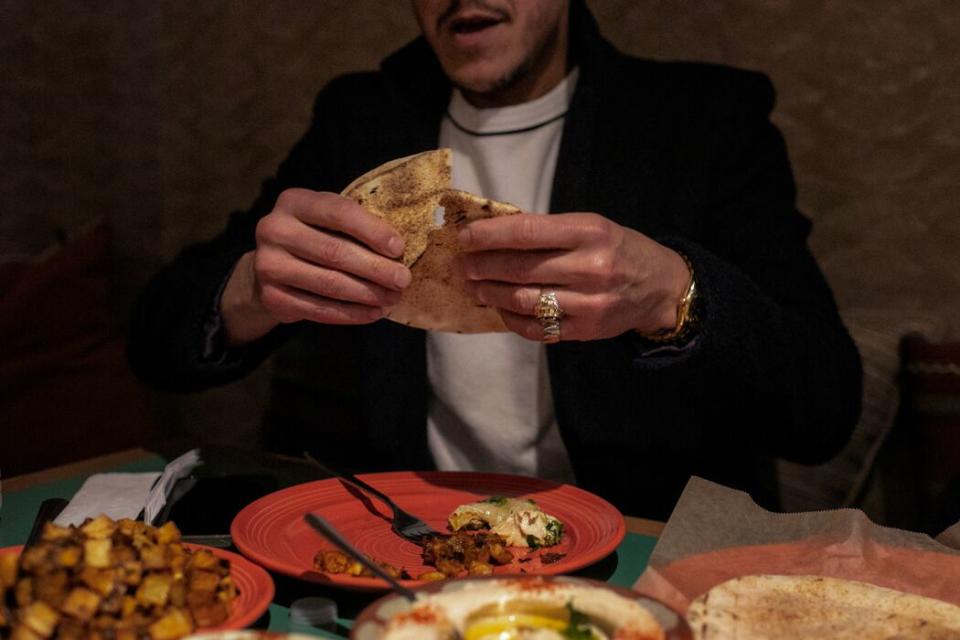
Rossi greets Sunnin Lebanese Café owner Nicole Chammaa with a warm “kayf halik” as he walks through the doors. This sets Chammaa into a flurry of Arabic as she ushers Rossi to a table in the back corner of the busy restaurant. The two converse in Arabic for a minute before Chammaa jumps up and puts a hand to her chest, visibly aghast.
“You don’t eat dairy?” she says. “How could you not eat cheese? I love cheese. It’s OK. I’ll bring you some things.”
As she walks away, Rossi laughs.
“She reminds me so much of my mom,” he says. “Totally upfront. She hears me say one word in Arabic, and she has to know your whole life. It’s just the way it is. I love it.”
Rossi consulted family members and friends in Lebanon on the Arabic he spoke as Youcef in “Emily the Criminal,” having them record themselves reading the script. He listened to it for days, trying to get the pronunciation and inflections just right.
Within minutes, the procession of food starts. It seems Chammaa found plenty for Rossi to eat. A plate of stuffed grape leaves, bowls of hummus and babaganoush, spicy potatoes, garlic sauce, falafel, fried cauliflower, ramekins of tahini and a basket of warm pita bread. Chammaa and her brother nestle into the booth next to Rossi to supervise dinner.
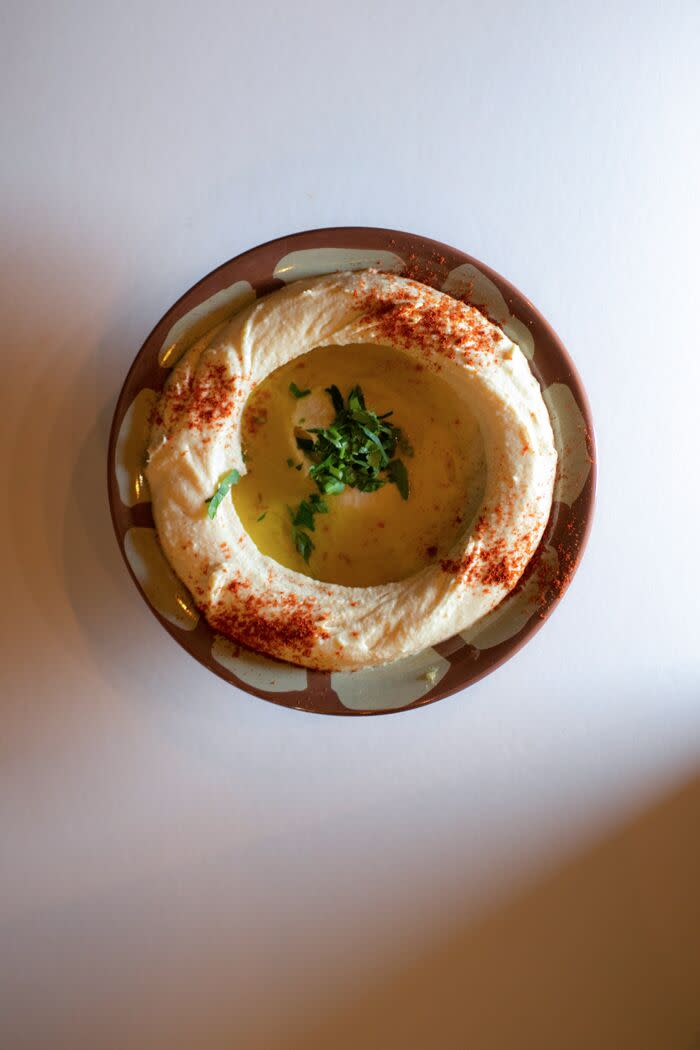
“I like to put the falafel in the pita bread with the vegetables,” Chammaa says, directing us to do the same.
“Did you try my babaganoush yet? It’s the best.”
“I’m completely reinvigorated by this,” Rossi says, surveying the table. “It feels authentic and very familiar."
He marvels at the softness and spice in the grape leaves, then moves on to the hummus.
“It’s the texture,” he says. “There are some interesting ones out there. I know you can even get chocolate hummus, but it’s not for me. I’m a traditionalist. It just feels like you don’t need to do that.”
He’s slowing down but all too aware that Chammaa is watching. At her insistence, he tries a ball of falafel.
“It’s like a taste bomb,” he says. “It’s so good it makes you angry.”
Though this is their first time meeting, Chammaa laughs and gives Rossi a hug like they’ve been friends for years.
“I’m glad this was our last stop,” he says. “It feels like home.”
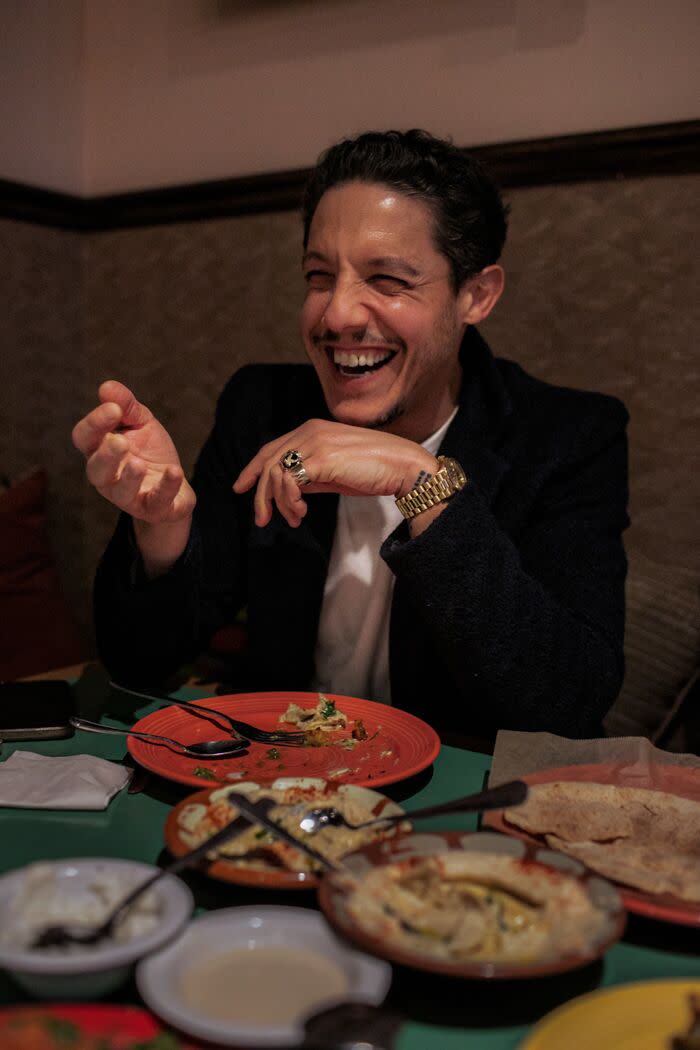
This story originally appeared in Los Angeles Times.

